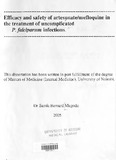| dc.contributor.author | Samia, Bernard M | |
| dc.date.accessioned | 2013-05-25T06:29:34Z | |
| dc.date.available | 2013-05-25T06:29:34Z | |
| dc.date.issued | 2005 | |
| dc.identifier.citation | Masters of Medicine (Internal Medicine) | en |
| dc.identifier.uri | http://erepository.uonbi.ac.ke:8080/xmlui/handle/11295/25528 | |
| dc.description.abstract | The treatment of plasmodium [alciparum malaria is facing significant challenges
due to the rapidly emerging drug resistance patterns to the commonly used antimalarial
monotherapies. Many countries are now changing/have changed their antimalarial drug policies in
line with the current recommendation for the use of combination therapies .
Even though artesunate and mefloquine have used as monotherapies in the
treatment of malaria in Kenya for a long time, there is insufficient data on the clinical outcome when
used as a combination therapy. This study was conducted to derive data on the efficacy and safety
profile of artesunate/mefloquine combination in the treatment of uncomplicated p. [alciparum malaria
in the Kenya.
Bungoma District of Kenya, an area with a stable endemic malaria transmission
pattern.
This was an open-label single arm clinical trial on patients with uncomplicated
p. [alciparum malaria. 200 patients were enrolled in the study and treated with a three-day course of
oral artesunate/mefloquine administered simultaneously, and followed up on out-patient basis upto
the 28th day for clinical and parasitological responses. Adverse events, both drug-related and non
drug-related were recorded during the treatment and follow-up period.
In the evaluable patient population, day 28 cure rate was 98.4%, while days14 and 7
cure rates were 98.4% and 99.2% respectively. Day 28 cure rate in the Intention To Treat population
using the last observation carried forward method (LOCF) was 92%. There was rapid relief of
symptoms by 82%, 89% and 97% on days 1,2 and 3 respectively. The median time to fever clearance
was one day. The commonest, drug related adverse events were mild to moderate degrees of
headache, dizziness and asthenia occurring in 57% of the patients. Severe adverse events occurred in
6% of the patients. There was no significant derangement in the haematological, biochemical, and
ECG parameters of the patients on treatment.
Artesunate/mefloquine combination was found to be highly effective in the treatment
of uncomplicated p.falciparum malaria, with a significant though tolerable side effect profile.
Arteunate/rnefloquine is recommended a viable option for use in the treatment
of uncomplicated p.falciparum malaria in this region. Further studies on this drug combination need
to be conducted in other parts of the country to determine if the obtained results are reproducible
hence possible widescale use. | en |
| dc.language.iso | en | en |
| dc.publisher | University of Nairobi | en |
| dc.title | Efficacy and safety of artesunate/mefloquine in the treatment of uncomplicated P. Jalciparum infections | en |
| dc.type | Thesis | en |
| dc.description.department | a
Department of Psychiatry, University of Nairobi, ; bDepartment of Mental Health, School of Medicine,
Moi University, Eldoret, Kenya | |
| local.publisher | School of Medicine | en |

